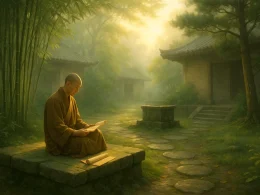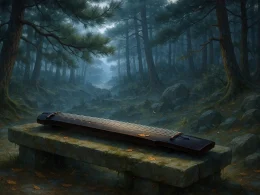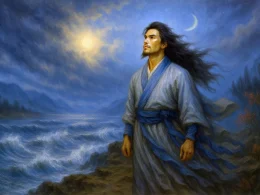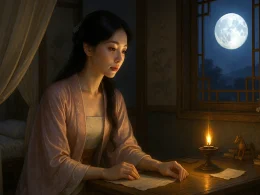The general's strategies reach far and wide,
His supreme command, with nine honors dignified.
He recalls the ancient heroes' steadfast might,
To repay his enlightened lord's grace so bright.
From west of mountains, courage surges free,
While wandering souls roam north of the frontier's lee.
Drums pound as they climb Longshan's high ridge,
Reins drawn, they charge down to the plain's wide bridge.
They vow to cross the desert, vast and stark,
And march serene through Yumen Gate's frontier arc.
Light supplies allow no rest at night,
Urgent whips drive war-chariots in flight.
Bitter winds blow fierce on the borderland,
Their steeds grow weary across the sand.
Snow dims Tianshan's paths, obscure and deep,
Ice blocks Jiaohe's source, in frozen sleep.
Frost-blurred spearheads lose their gleaming hue,
Chilled banners freeze, no longer flutter through.
Upright and firm, he leans on his long sword,
As sunset fades, dust veils all in accord.
Original Poem
「出塞」
虞世南
上将三略远,元戎九命尊。
缅怀古人节,思酬明主恩。
山西多勇气,塞北有游魂。
扬桴上陇坂,勒骑下平原。
誓将绝沙漠,悠然去玉门。
轻赍不遑舍,惊策骛戎轩。
凛凛边风急,萧萧征马烦。
雪暗天山道,冰塞交河源。
雾锋黯无色,霜旗冻不翻。
耿介倚长剑,日落风尘昏。
Interpretation
This poem is a classic example of frontier-themed poetry from the Tang Dynasty. In the early Tang period, the state was in a phase of territorial expansion, with frequent military campaigns along the borders. Although Yu Shinan was known for his refined and elegant literary style, in this work he adopts the ancient title "Marching Beyond the Frontier" to depict the solemn setting of an expedition and the harsh conditions faced by the soldiers, while also expressing praise for the loyalty and courage of frontier commanders. The imagery is powerful and desolate, reflecting the high regard early Tang literati had for national defense and the spirit of the military.
First Couplet: "上将三略远,元戎九命尊。"
Shàngjiàng sān lüè yuǎn, yuán róng jiǔ mìng zūn.
The general masters the strategies of the Three Tactics;
The commander’s post, fraught with peril, is held in high honor.
“Three Tactics” (三略 sān lüè) refers to an ancient military text, symbolizing sophisticated strategic acumen. “Fraught with peril” (九命 jiǔ mìng) suggests the life-and-death stakes of command. The poet begins by highlighting the general’s wisdom and the gravity of his duty, foreshadowing the hardships of the campaign. This is not only praise for the commander but also an implicit reflection on the brutality of war.
Second Couplet: "缅怀古人节,思酬明主恩。"
Miǎnhuái gǔrén jié, sī chóu míng zhǔ ēn.
He recalls the moral integrity of ancient heroes,
Determined to repay the grace of his enlightened sovereign.
“Moral integrity of ancient heroes” (古人节 gǔrén jié) invokes the noble spirit of past paragons, linking tradition to the present. “Repay the grace” (酬明主恩 chóu míng zhǔ ēn) reveals the soldiers’ inner motivation: loyalty to the ruler and devotion to the state. This couplet embodies the Confucian ideal of “dying for one who recognizes your worth.”
Third Couplet: "山西多勇气,塞北有游魂。"
Shānxī duō yǒngqì, Sàiběi yǒu yóuhún.
Shanxi abounds with valor;
Beyond the northern frontier wander the souls of the fallen.
“Shanxi” (山西 Shānxī) was a historically vital military region, producing countless brave warriors. “Beyond the northern frontier” (塞北 Sàiběi) underscores the tragic cost of border warfare, where many have perished and become “wandering souls” (游魂 yóuhún). The stark contrast highlights the courage of the living and mourns the sacrifice of the dead.
Fourth Couplet: "扬桴上陇坂,勒骑下平原。"
Yáng fú shàng lǒng bǎn, lēi qí xià píngyuán.
Drums are raised ascending Longban slopes;
Reins are drawn tight charging down to the plains.
“Drums are raised” (扬桴 yáng fú) signifies boosting morale with battle drums, embodying military might. “Reins are drawn tight” (勒骑 lēi qí) depicts the disciplined advance of cavalry. This couplet portrays the army’s majestic momentum through contrasting terrain—ascending and descending—creating a dynamic and grand scene.
Fifth Couplet: "誓将绝沙漠,悠然去玉门。"
Shì jiāng jué shāmò, yōurán qù Yùmén.
They vow to cross the desert’s expanse,
Resolutely marching beyond Yumen Pass.
“Yumen Pass” (玉门 Yùmén) was a key gateway to the Western Regions, representing the farthest reach of the frontier. This line conveys the troops’ determination to overcome the harsh desert and push the boundaries of the empire, blending resolve with dignified courage.
Sixth Couplet: "轻赍不遑舍,惊策骛戎轩。"
Qīng jī bù huáng shě, jīng cè wù róng xuān.
Traveling light, they dare not rest;
Urging startled horses, they race by war chariots.
“Traveling light” (轻赍 qīng jī) indicates swift, urgent movement. “Urging startled horses” (惊策 jīng cè) intensifies the atmosphere of urgency. The couplet captures the rapid, tense pace of the march, evoking the immediacy of the battlefield.
Seventh Couplet: "凛凛边风急,萧萧征马烦。"
Lǐnlǐn biān fēng jí, xiāoxiāo zhēng mǎ fán.
The frontier wind blows fierce and cold;
Warhorses neigh wearily, burdened and tired.
The reduplicatives “fierce and cold” (凛凛 lǐnlǐn) and “wearily” (萧萧 xiāoxiāo) enhance the sensory impact, merging environmental harshness with the army’s fatigue. The wind’s urgency and the horses’ exhaustion reflect the grueling nature of the expedition.
Eighth Couplet: "雪暗天山道,冰塞交河源。"
Xuě àn Tiānshān dào, bīng sāi Jiāohé yuán.
Snow obscures the paths of Tianshan;
Ice blocks the source of the Jiaohe River.
Tianshan and Jiaohe were real geographic features in the Western Regions. This couplet uses extreme conditions—snow-blinded roads and frozen rivers—to emphasize the expedition’s hardships, painting a picture of stark, frigid isolation.
Ninth Couplet: "雾锋黯无色,霜旗冻不翻。"
Wù fēng àn wú sè, shuāng qí dòng bù fān.
Fog dims the blades, their gleam lost;
Frost stiffens the flags, unable to flutter.
Vivid details highlight the cold’s severity: swords lose their shine, and flags freeze solid. The martial splendor is subdued by the extreme elements, deepening the poem’s somber and heroic tone.
Tenth Couplet: "耿介倚长剑,日落风尘昏。"
Gěngjiè yǐ chángjiàn, rìluò fēngchén hūn.
Upright, they lean on long swords;
At sunset, wind and dust shroud all in darkness.
“Upright” (耿介 gěngjiè) denotes unwavering integrity. Despite the darkening, dusty environment, the soldiers stand firm with their swords, symbolizing unyielding resolve and steadfast faith. The poem concludes with a solemn and majestic image, unifying the vastness of the frontier with the perseverance of its defenders.
Holistic Appreciation
This poem powerfully depicts the scene of an expedition: expressing reverence for commanders, admiration for ancient heroes, praise for soldiers, and acknowledgment of environmental dangers, while also mourning the fallen. The narrative progresses from the “general” and “commander” to “crossing the desert,” then to “snow-darkened Tianshan” and “sunset dust,” blending human endeavor with natural forces to create a vast, desolate atmosphere. The ending, “upright, they lean on long swords,” unites the heroic grandeur of frontier poetry with the moral steadfastness of the literati.
Artistic Merits
- Grand theme: The depiction of the frontier expedition is epic in scope, both narrative and lyrical.
- Dynamic and static balance: Battle drums, warhorses, deserts, and mountains create a sense of motion, while the desolate setting adds solemn stillness.
- Geographical authenticity: References to Yumen Pass, Tianshan, and Jiaohe root the poem in real locations, enhancing its realism.
- Scene and emotion fused: The depiction of natural harshness alongside human determination creates a tragic and heroic mood.
- Resonant language: Reduplicatives like “fierce and cold” (凛凛) and “wearily” (萧萧), along with strong verbs such as “obscures” (暗) and “blocks” (塞), intensify the rhythm and impact.
Insights
Yu Shinan’s work portrays the heroic scene of soldiers marching beyond the frontier and the perils they face: the vast desert, snowy Tianshan, and dusty twilight. It praises loyalty and courage while reflecting war’s difficulty and gravity. The poem reminds us that what is truly memorable is not glory in ease but perseverance in adversity. Whether in windblown sands or icy obstacles, they remain “upright, leaning on long swords,” demonstrating the belief in dying for those who value them. This spirit inspires us: on life’s journey, obstacles are inevitable, but only with great purpose and the courage to endure can we leave a resolute mark amid hardship and darkness.
About the Poet
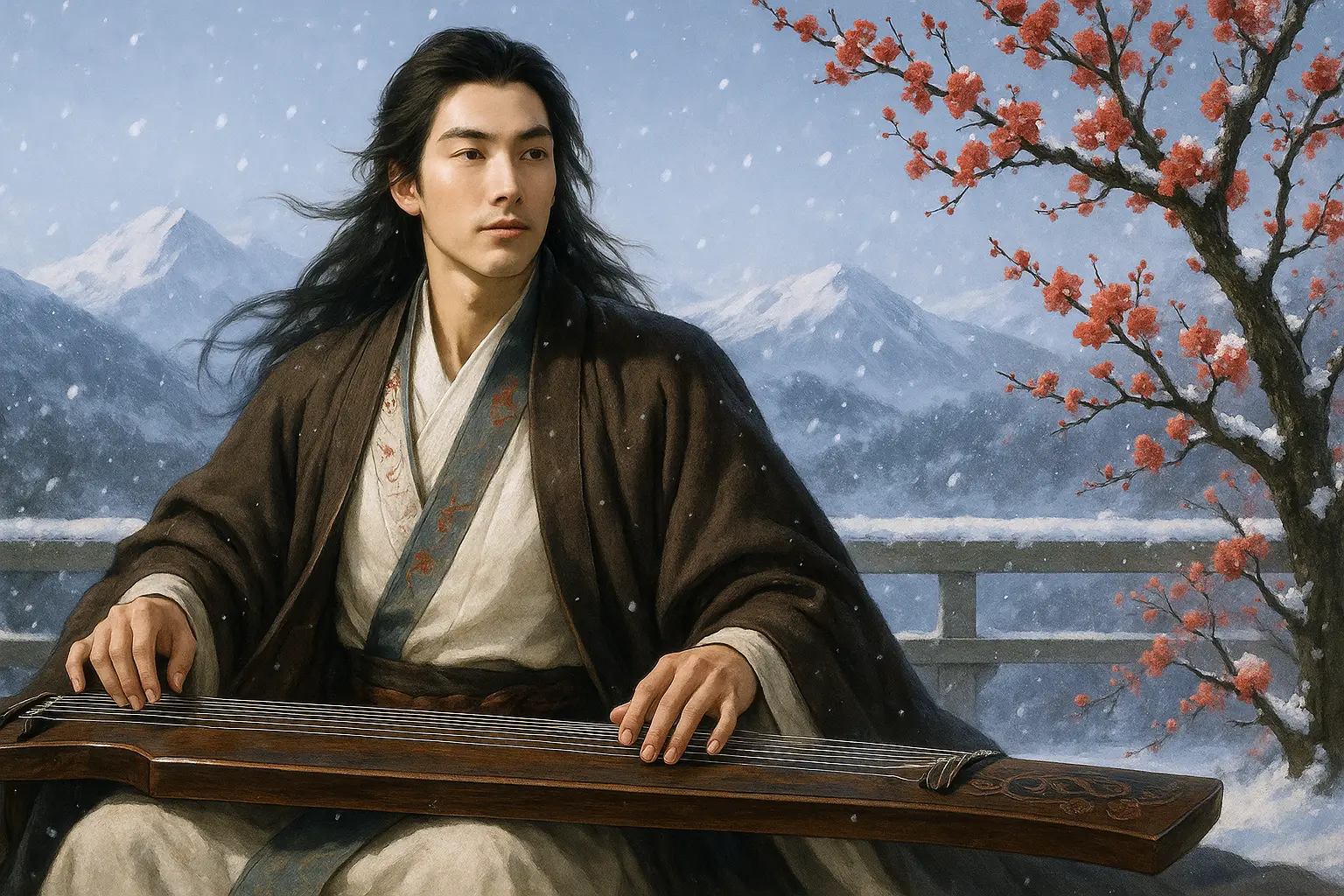
Yu Shinan (虞世南 558 - 638), a native of Yuyao in Zhejiang Province, was a prominent statesman, writer, calligrapher, and politician during the Zhenguan era of the early Tang dynasty. As one of the "Twenty-Four Meritorious Officials of Lingyan Pavilion," he rose to the position of Director of the Imperial Library. His calligraphy earned him a place among the "Four Great Calligraphers of the Early Tang," alongside Ouyang Xun, Chu Suiliang, and Xue Ji. In poetry, he inherited the tradition of Xu Ling and pioneered a refined, balanced, and harmonious courtly style. He also compiled the North Hall Book Excerpts, establishing a new genre of encyclopedic literature.









